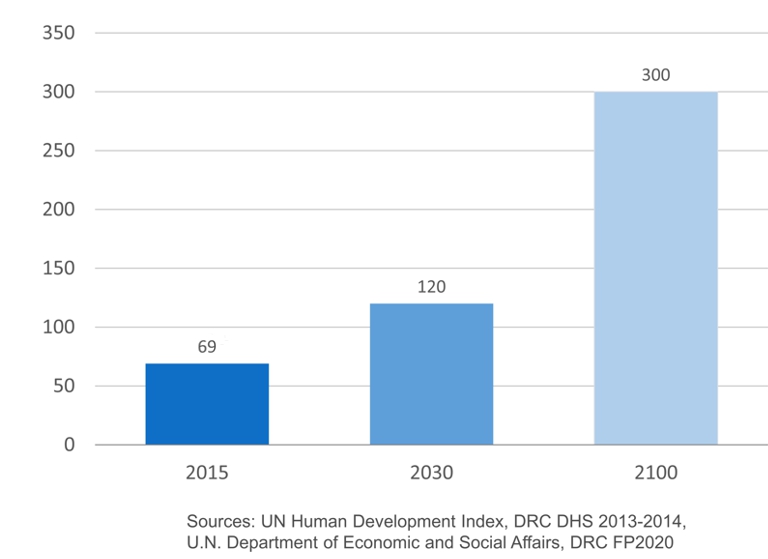DRC
| The Democratic Republic of the Congo (DRC) is the fourth most populous nation in Africa and the 20th most populous in the world, with a population of almost 80 million people. The country’s population is projected to increase to 120 million in 2030, and to reach 300 million by 2100. The DRC also has the world’s 23rd highest total fertility rate, with 4.6 children born per woman. Meanwhile, the country’s modern contraceptive prevalence rate (mCPR) was just under 8% among married women nationally in 2014, up slightly from just under 6% in 2007.
The DRC is rich in natural resources; however its historically unstable political systems and lack of infrastructure have impeded the country’s development and made life difficult for Congolese. According to the 2016 Human Development Index, the country has a low level of human development as it ranked 176th of 188 nations. After the 2012 London Summit on Family Planning, the DRC government pledged to increase mCPR to 19% by 2020. |
The current population is expected to almost double in size to 120 million in 2030, and at least 300 million in 2100.
|
The Bill & Melinda Gates Foundation (BMGF) portfolio of family planning (FP) investments in the DRC comprises a cross-cutting set of initiatives that include key program strategies of improving FP enabling environments through advocacy and systems strengthening, testing innovative models of FP service provision and demand generation with a special focus on targeting youth and engaging the private sector to increase access to services.
Geographically, the investments are focused primarily at the national level and in Kinshasa with newer expansion of successful models into Kongo Central Province (formerly Bas-Congo) and additional advocacy efforts in other provinces. The service delivery project ACQUAL I (follow-on project ACQUAL II), has been well-established since 2010 in Kinshasa. It focuses on expanding access to FP services through community based distributors (CBDs) and fixed health facilities, and on improving quality of care through training providers and CBDs. ACQUAL has also conducted research to introduce Sayana® Press through CBDs. Its service delivery models are now being expanded to Kongo Central, and include a greater focus on increased quality, expanded method choice, and an emphasis on targeting youth as well as military, police and their families.
Other recent investments specifically addressing the needs of youth and adolescents are the Global Early Adolescent Study (GEAS) and, in the private sector, DKT. Expansion of the portfolio through new investments now includes:
- Additional demand generation activities (led by Johns Hopkins University – Center for Communication Programs/JHU-CCP under ACQUAL II)
- Better understanding the reproductive health (RH) needs of youth and early adolescents
- Capacity-building with the national RH Program (PNSR), national program for adolescent health (PNSA) and the creation and strengthening of national and province-level CTMPs
- Provision of new methods
- Increasing access through public and private sectors to all methods.
Since inadequate supply chains pose a significant barrier to expanded FP, multiple stakeholders are being utilized to establish estimates of projected commodity and service resource needs through 2020.
An overview of the BMGF FP investments in DRC can be viewed at the interactive timeline.

